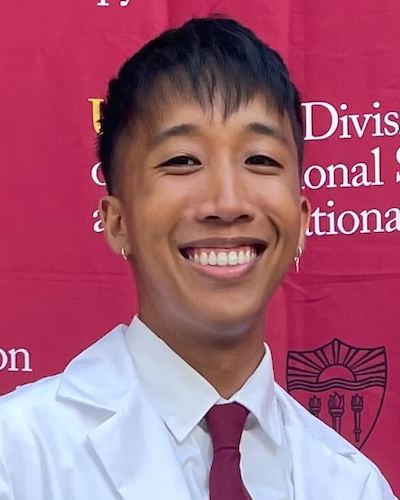Student Blog
Jared

Finding My Calling: Journey to Occupational Therapy from the Heart of the Philippines ⟩
January 25, 2024, by Jared
Six years ago, I strolled along the dirt road with my mom and sister to visit the province in the Philippines where my relatives still live. Around me were homes made of crumbling concrete and tarped roofs, and fences made of plastic water bottles. Kids were running around barefoot and the broken eyes of titas and titos were trying to sell the last of their produce for the day. But behind the exterior of hardship, the Filipino culture was alive and well. Children danced traditional Filipino dances, elders played rich music once played by their ancestors, and lolas sang to the whole province on their outdated karaoke machines. The sight of a colorful culture thriving despite the poverty that surrounded my own people was not only inspiring, but life-changing in terms of my future goals of being an occupational therapist.
Occupational therapy is still in its early stages of development in the Philippines. Upon our visit to the therapy clinic where my aunt worked, I observed a modest setting — a plain room with limited equipment — where therapeutic interventions were provided to a diverse range of Filipinos. As I watched therapists treat patients, I remember feeling deeply troubled watching a young man who needed maximum assistance to move a rock from one area on a table to another. But even more so, I noted that these rudimentary interventions could be transferable and more widely used.
My aunt shared insights into the challenges faced by many individuals in the Philippines who struggle to resume their regular routines after experiencing physical disabilities. This difficulty arises from the inadequate access to proper care in medical facilities. The combination of impoverished living conditions and a shortage of occupational therapists contributes to a scenario where preventable disabilities go untreated.
Initially, I found her statements perplexing, especially considering that the interventions observed involved simple materials such as rocks, cups, and paper. However, upon reflection, I came to understand the larger issue at hand. The simplicity of the therapeutic materials highlighted not only a lack of awareness about occupational therapy in the country but also a lack of advocacy. This gap was particularly evident in impoverished areas, including my family’s province, where individuals faced challenges accessing essential rehabilitative services.
Although my experience at my aunt’s clinic in the Philippines was brief, it left a lasting impact on determining the focus in my future occupational therapy career. As someone who is constantly inspired by the beauty of my own culture, I realized that I wanted to help people carry on traditions that gave them purpose, whatever their background. In undergrad, I adopted a Philippine Studies minor and served on the executive board of Kasamahan, the University of San Francisco’s Filipino cultural organization — this has given me a holistic perspective of how people’s engagement in their culture can deeply affect their quality of life. These experiences solidified my desire to give client-centered interventions that help the individual stay as connected to their occupations as possible, whether they are cultural or not.
Equally important, I want to use my awareness of negatively perpetuated systems in both the United States and Philippines to advocate for the profession and bring awareness to the field. From the occupational therapists that I have shadowed under during fieldwork and volunteering, I’ve learned how simple yet life-changing interventions can be. From analyzing post rotary nystagmus in children on the Autism spectrum to teaching older adults how to safely ambulate with a walker, my experiences have challenged me to explore how interventions can be transferred to communities that are in need of our services.
In developing nations like the Philippines, there is potential to further advocate and educate about occupational therapy to enable individuals to actively consider it as a valuable therapeutic option.
I hope to bring my passion and future knowledge of occupational therapy to the Philippines and eventually be an educator for future generations. This is in hopes that we can reform health care policies to accommodate those from lower socioeconomic classes and render needed professional service.
Through occupational therapy, I have the opportunity to apply the underlying practices and values of the traditions that I hold dear to my heart. My experience in the Philippines, a developing nation rich in cultural tradition has made me appreciate the sacredness as well as the practicality of healing and movement. I am profoundly motivated to help others share this view and work as agents of positive change in the world.
⋯





